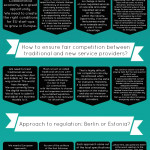We have the pleasure to present you the third round of 4discussion devoted to sharing economy. See what do Dita Charanzová, Kalle Palling, Marek Harbulak and Róbert Chovančuliak say on the topic and feel free to comment on that!
Dita Charanzová – MEP, ALDE. Czech diplomat, manager, consultant and senior government official whose carrier focused on European Union and International Trade issues. Since July 2014 she is a Member of the European Parliament.
Sharing economy: Threat or opportunity?
Collaborative economy is a great opportunity. We need to create the right conditions for EU start-ups to grow in Europe.
How to ensure fair competition between traditional and new service providers?
We need to treat traditional services the same way like Uber and AirBnB, not the other way around. The world has changed. We are currently living the digital revolution. We all have to admit it and adjust our business models to it.
Approach to regulation: Berlin or Estonia?
We need a European approach; otherwise the market will be very fragmented. There is a lot of discrimination on the basis of your nationality, IP addresses etc. We have to find a way to make the digital single market fully work.
Can internet-driven self-regulation (reviews etc.) replace legislative one?
Definitely. We need ex-post controls, not ex-ante. The whole process is driven by the consumers. If the consumer is not happy, the business will sooner or later end. The only question is what we will do if something goes wrong, but I will definitely be against any ex-ante controls.
 Kalle Palling – Member of Parliament, Estonian politician, representing the Reform Party. Palling was first elected to the Riigikogu in 2007.
Kalle Palling – Member of Parliament, Estonian politician, representing the Reform Party. Palling was first elected to the Riigikogu in 2007.
Sharing economy: Threat or opportunity?
Lack of flexible income opportunities, climate change, inefficiency of economy and overly bureaucratic governments are threats. Collaborative economy is an opportunity which can contribute to solving them. It is a business revolution, but it also has the potential to be an environmental and economic one.
How to ensure fair competition between traditional and new service providers?
Most current so-called traditional services were once perceived themselves as disruptive. Innovation increases efficiency. It is fair to trust our communities with the freedom to choose and not suppress innovation by outdated legislation, which needs to be reviewed for all parties.
Approach to regulation: Berlin or Estonia?
As one of the authors of the first Estonian collaborative economy legislation I am convinced it is best fit for Estonia. However, context often varies in countries and there is no point of backseat driving. For Estonia, I believe we are on the right side of the history.
Can internet-driven self-regulation (reviews etc.) replace legislative one?
Experience of consumers have in many cases much more value than a certificate issued by government official , because it describes a real life situation, not just a single moment of effort. When buying a mobile phone we look for reviews on TechRadar or Phone Arena, not an EU certificate.
 Marek Harbulak – President of the Slovak Tourism Association and CEO of the Slovak Association of Hotels and Restaurants
Marek Harbulak – President of the Slovak Tourism Association and CEO of the Slovak Association of Hotels and Restaurants
Sharing economy: Threat or opportunity?
Threat, if there will be no change in terms of over-regulated services on one side and under-regulated services on the other within the industry. Opportunity, if we take the business model as an example and try to use it to our advantage.
How to ensure fair competition between traditional and new service providers?
That is highly difficult, fair competition can only be achieved when the conditions are the same for everyone. Therefore, it is essential to minimize/decrease unnecessary regulation in the industry and also set minimum standards for new service providers.
Approach to regulation: Berlin or Estonia?
Each approach came out of the local specifications and varied outcomes for the local public. It is highly individual and it will require sensitive approach; incorporating voices of local administration and of the local business sector.
Can internet-driven self-regulation (reviews etc.) replace legislative one?
Not in all aspects, minimal requirements need to be kept in place to ensure guests´ health safety and security.
 Róbert Chovanculiak – Member of INESS since 2015, after a period of external cooperation. He is currently a Ph.D. student at the Department of Public Economics and Regional Development at the Faculty of Economics of the Matej Bel University, Slovakia. He worked for Slovak Business Agency prior joining INESS. Róbert’s field of professional interest is public finance, economic policy, regulation, and education.
Róbert Chovanculiak – Member of INESS since 2015, after a period of external cooperation. He is currently a Ph.D. student at the Department of Public Economics and Regional Development at the Faculty of Economics of the Matej Bel University, Slovakia. He worked for Slovak Business Agency prior joining INESS. Róbert’s field of professional interest is public finance, economic policy, regulation, and education.
Sharing economy: Threat or opportunity?
Opportunity. Don’t get me wrong. There will be losers. As every disruption, sharing economy threats traditional ways of doing things. So how can I be sure that there will be more winners? The main reason is that this change is taking place by a chain of voluntary exchanges. The voluntariness is the ultimate test of net benefits for society. Hence, sharing economy is a threat to some but an opportunity for everybody.
How to ensure fair competition between traditional and new service providers?
The common answer is to level playing field. But the real question is which way and to what extent. It seems plausible that current regulations create excessive burden without contributing adequate benefits. Thus, the playing field should be leveled toward less regulations. When someone has a broken leg, it doesn’t follow that we must go about breaking everybody else’s legs.
Approach to regulation: Berlin or Estonia?
“Shoot first, ask questions later“ is the worst reaction to the sharing economy. This was, however, the approach of many (local) governments. It not only cut off current customers and suppliers from the mutually beneficial exchange but it cut off the whole society from the future potential of new technologies and solutions to all kinds of problems, needs and desires. Estonia got this.
Can internet-driven self-regulation (reviews etc.) replace legislative one?
First of all, it is important to recognize that we have to compare real public regulations with real private regulation. Neither of them is perfect. However, creators of private regulations are owners and it is in their self-interest to create as effective regulations as possible. This doesn’t hold for public regulations. Thus, if it was just matter of effectiveness we could expect that self-regulation will replace legislative one. But politics is often about a pursuit of narrow groups interests.
See the infographic:





